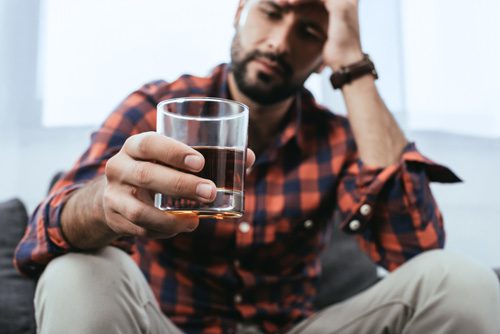Alcohol Use: When Is It a Problem?
 It is not uncommon for a person who struggles with alcohol use to deny they have a drinking problem. Sometimes, their family and friends can see they are struggling with alcohol use. Other times, the person themselves may wonder if their alcohol consumption has crossed the line.
It is not uncommon for a person who struggles with alcohol use to deny they have a drinking problem. Sometimes, their family and friends can see they are struggling with alcohol use. Other times, the person themselves may wonder if their alcohol consumption has crossed the line.
Warning Signs of AUD
While many warning signs of alcohol use disorders are recognizable, others are not as easy to identify. To help you see your own or a loved one’s drinking patterns more clearly, we offer below eight common warning signs that can indicate alcohol abuse or addiction.
- You Drink More than You Planned
Maybe you start out drinking with the intention of having just one or two drinks. But you always or almost always continue to drink beyond your intended amount. Consistently drinking more than you wanted to indicates you have trouble being in control of yourself when you are consuming alcohol. It is an early warning sign of problematic drinking. - Alcohol Takes Up a Lot of Your Time
A great deal of your time revolves around alcohol, both procuring it and drinking it. This includes the time you spend feeling sick after you consume it and the time it takes to recover from the hangover. You also spend a lot of time thinking about alcohol, such as when and where you will have your next drink. Some sources suggest keeping track of your time and activities for several weeks. Doing so will help you see the amount of time alcohol takes up in your life. - You Continue Using Alcohol Despite Being Aware of Problems
Even though you know the problems your drinking is causing, you cannot stop drinking. For example, you may have been driving under the influence and received a DUI, or your spouse may have filed divorce papers because of your uncontrolled drinking, yet you continue to drink. The problems your alcohol use causes are not enough to make you stop. Some people become so wrapped up in denial they do not realize or understand the impact of their actions and the resulting consequences. They often lose their perspective and their control, causing them to continue in a downward spiral. - You Make Poor Decisions
When you have too much to drink, your brain has difficulty seeing the possible results of making a poor decision. You are more apt to make risky decisions that could cause harm to yourself or others. You may decide it is okay to drive while drunk, have unprotected sex, or go swimming in dangerous conditions. - You Give Up Things You Once Enjoyed
You avoid your friends and family and spend more time alone because you want to drink. You give up activities and hobbies you once enjoyed because you would prefer to be drinking. You do not have time to spend on anything that is not related to consuming alcohol. - You Constantly Crave Alcohol
Regardless of the situation, you constantly crave alcohol. Sometimes you cannot think of anything else until your need for it is satisfied. Your intense craving can be triggered by places, people, things, physical sensations, or emotions. Sometimes the strong urge to drink is triggered by a time of day that reminds you of drinking. You always want a drink. If you get a promotion at work, you want to get a drink to celebrate. If you lose your job, you need a drink to feel better. Whatever the situation or occasion is in your life, it calls for a drink or two. - You Lie About or Hide Your Drinking
If someone asks you how much alcohol you have had, you never tell the truth. You may hide alcohol throughout your house, inside your car, or in the yard. Maybe you sneak alcohol into work in your water bottle, take a flask into the movies, or have a flash in your pocket when you go shopping. - You Experience Withdrawal Symptoms
As the effects of alcohol wear off, withdrawal symptoms begin. Common symptoms of alcohol withdrawal include difficulty sleeping, depression, irritability, anxiety, restlessness, nausea, sweating, and shakiness. You will have a rapid heartbeat and a rise in blood pressure. You may experience fever, hallucinations, or seizures. Withdrawal symptoms occur because when you drink heavily, alcohol changes the chemistry in the brain. When you suddenly stop drinking, your brain is trying to adjust to the change.
We Can Help
If you or a loved one struggles with alcohol use and need help, you are not alone. At English Mountain Recovery, located in the serene Smoky Mountains of East Tennessee, our skilled professionals will help you reach your goal of lasting sobriety. Take the first step on the path to recovery. Call us today.
 Looking for holistic addiction treatment in Tennessee? To learn more about programs offered at English Mountain Recovery, call and speak with someone today at (877) 615-8569. We are ready to help you or your loved one recover.
Looking for holistic addiction treatment in Tennessee? To learn more about programs offered at English Mountain Recovery, call and speak with someone today at (877) 615-8569. We are ready to help you or your loved one recover.About the Author: 
Terry Hurley is a retired educational professional and freelance writer with more than fifty years of experience. A former reading specialist and learning center director, Terry loved her years working with children in the educational field. She has written extensively for print and online publications specializing in education and health issues. For the last six years, her writing focus has been on addiction and mental health issues.




